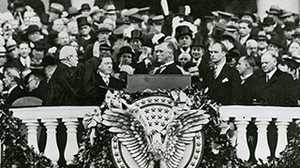An Emergency is On!
An African American journal, Opportunity, calls for equal wages for black workers.
Editorial by T. Arnold Hill, Opportunity: Journal of Negro Life
September, 1933
Negro workers are being discharged by employers whose belief in white supremacy will not tolerate their paying Negroes a wage equal to that paid whites. Fearful that such practices will force many Negroes now employed into idleness, some are suggesting that the codes of the National Industrial Recovery Act provide a dual wage scale -- one that will allow the option of paying a smaller wage to Negroes than to whites.
Such a position is economically unsound and socially unjust. Few employers will pay more for their labor than they have to. If they can get Negroes cheaper than they can whites, the latter will often find themselves unwanted and unemployed. This condition will tend to perpetuate the age-old strife between the two groups and make for actual warfare at a time when it takes little to foment either racial or industrial discord.
Moreover, it is impossible to have national recovery as long as one-ninth of the nation's workers are not given the opportunity to recover. If high wages are essential to an improved economic and social state, then recovery of business and public welfare is retarded to the extent that low wages are permitted. In leaving agricultural and domestic workers out of the code formula, the bulk of Negro workers, some 3,000,000 out of a total of 5,500,000, will continue to live under a system which is little better than slavery. Wages now for domestic workers in the South are down to as low as $1.50 per week, and three dollars a week is regarded as a good wage.
It has been contended that what the nation needs to lift it out of the depression is adequate consumption for normal production of goods. Because we are not able now to consume all products farmed, it is costing the government millions to subsidize farmers who are turning crops back into the soil rather than harvest them for a market over-stocked with farm products. If the 2,500,000 Negroes in the North and the 9,500,000 in the South earned more they would buy more. The masses of Negroes have never purchased enough food, clothing, furniture, transportation, hospitalization, and the like. Twelve million people would greatly expand production if they were employed and paid according to their economic value rather than their social status.
If a correlation were established between the wages paid Negro workers and the minimum wage level for all workers, it would undoubtedly show that the starvation wages received by Negroes have been directly responsible for limiting the economic security of all workers, as well as for contracting the market for consumer goods. Thus, Mississippi and South Carolina must forever be backward states as long as one-half the members of their population are not allowed sufficient livelihood to purchase their normal share of their state's products.
If employers are unwilling to pay Negroes wages equal to those paid whites, then let them be discharged. There should be no wage distinction based upon race in the NRA codes. To the extent that people are unemployed, to that same extent will those who work have to take care of them. This fits Negroes as well as whites. If all Negroes are discharged in the South, so that whites may work, then the employed whites will have to support the idle Negroes. It is unfair, of course, that the race should be forced into mendicancy, but it is better that Negro workers insist upon wages equal to those paid whites, even if it means their ultimate discharge, than to accept smaller wages and thereby perpetuate the class distinctions that now exist. Neither position is a satisfactory one for the Negro, but it is fair to assume that if the burden of support for the maintenance of Negroes were thrown upon the State, conditions would tend to right themselves much more quickly than if Negroes submitted to a smaller wage.
But more than this, the Government of the United States and the Recovery Administration, must put an end to this hypocrisy for the sake of national integrity. At some point this system of exploitation must cease. It impedes prosperity and disqualifies the government as a democracy fit to pass sentence upon other nations. President Roosevelt cannot permit the United States to rush to the protection of Cuba and at the same time tolerate the enslavement of its own fellow-citizens. Neither can our economic experts permit race prejudice to nullify all the thinking, planning and work that have gone into the agricultural and industrial plans for business recovery. Is the New Deal departing from the conventional in all important national issues, to be listless to the plight of twelve million persons, merely because they are darker than the other 110,000,000? Are we to have a New Deal for whites and an old deal for Negroes? The United States cannot possibly remain an international arbiter if it continues to neglect to arbitrate its own domestic affairs.
As serious a national blunder as the neglect of Negroes is, it is not as disturbing as the failure of Negroes to rouse themselves on behalf of their own salvation. This is largely because Negro leaders have not agreed upon a program. They are in agreement that something is wrong; and while they suspect that it has its foundation in economics, they are not sure what the "something" is, nor how to get rid of it. Those who have been leading are unwilling to try new ideas or new personnel. Ignorance and custom are not the only drawbacks. Traditional enmities, factional differences, organizational loyalties, personal likes and dislikes all stand in the way of a united front at the time when the most potent weapon is the impact upon governmental authority of a solidified public opinion representative of Negroes everywhere and of every activity in life. There has been no honorable attempt to bring this about. When efforts are undertaken with the same bias and selfishness that have so often characterized projects of this sort heretofore, then we can expect weak organizations, weak support, and weak results.
An emergency is on. It calls for forthright leadership that will indoctrinate Negro masses with an awareness of the effect of economic relationships upon other aspects of life. It demands leadership that will provide a program for insulating Negroes with industrial and occupational information and firing them with devotion to a cause that is just and fruitful. This leadership is needed to compel the respect of the Administration and to build an esprit de corps among the masses of Negroes who are ready psychologically for a program as they have never been before.






